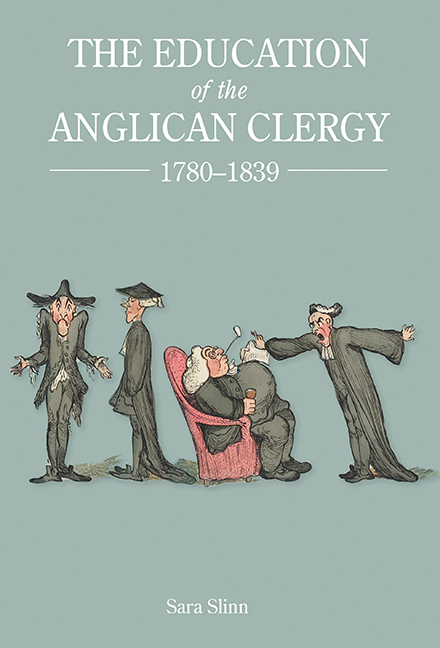Book contents
- Frontmatter
- Contents
- Illustrations
- Acknowledgements
- Abbreviations
- Introduction
- Part One Entrants to the Clerical Profession, 1780–1839
- Part Two Routes to Ordination
- 3 The Ordinand and the University
- 4 Literate Clergy and the Grammar Schools
- 5 Autodidacts, Tutors for Orders and Parish Clerical Seminaries
- Conclusion
- Appendix 1 Ordination Profiles of Bishops, 1780–1839
- Appendix 2 A Note on Methodology
- Bibliography
- Index
- Miscellaneous Endmatter
5 - Autodidacts, Tutors for Orders and Parish Clerical Seminaries
from Part Two - Routes to Ordination
Published online by Cambridge University Press: 30 August 2017
- Frontmatter
- Contents
- Illustrations
- Acknowledgements
- Abbreviations
- Introduction
- Part One Entrants to the Clerical Profession, 1780–1839
- Part Two Routes to Ordination
- 3 The Ordinand and the University
- 4 Literate Clergy and the Grammar Schools
- 5 Autodidacts, Tutors for Orders and Parish Clerical Seminaries
- Conclusion
- Appendix 1 Ordination Profiles of Bishops, 1780–1839
- Appendix 2 A Note on Methodology
- Bibliography
- Index
- Miscellaneous Endmatter
Summary
Autodidacts
Although the vast majority of men who took orders had undertaken formal, guided periods of study – whether at university, advanced grammar school, with tutors, or assisted by employers, family and friends – men who were almost entirely self-taught occasionally presented themselves for orders. Most, but not all, had an elementary classical education behind them, and on this foundation they were able to attain the necessary standard of Latin and Greek using primers, grammars and lexicons, and prosecuted their divinity studies using books they could buy or borrow. That they made so much progress with so little help is, perhaps, not so surprising when the pedagogical methods of the period are considered. Those boys who had received a grammar school education, where perhaps a master and an usher were the only teaching staff to cover six forms of boys, had – if they had made any progress at all – learnt to study alone with only episodic instruction from a master.
John Newton was such a man, having had only two years of grammar school education before joining the voyages of his merchant marine father. Of his studies he commented, ‘in all my literary attempts, I have been obliged to strike out my own path, by the light I could acquire from books, as I have not had a teacher or assistant since I was ten years of age’. Before ordination in 1764, he had improved his school Latin and had not only taught himself elementary Greek, but had also begun Hebrew and Syriac. George Crabbe received a classical and mathematical schooling before becoming a surgeon's apprentice at the age of fourteen. Business not prospering, he sought his fortune as a poet; having found patronage from Edmund Burke, and evincing a desire to enter the Church, he studied for orders, apparently unassisted, although with advice about his reading, taking deacon's orders in 1781. John Hellins, a labourer's son with only an elementary education, taught himself mathematics whilst he was a cooper's apprentice. His abilities brought him to the attention of local clergyman and mathematician Malachy Hitchins, who found him a post as an assistant at the Royal Observatory at Greenwich. There, as an adult, he began studying Greek and Latin as a prelude to taking orders, which he did in about 1779.
- Type
- Chapter
- Information
- The Education of the Anglican Clergy, 1780–1839 , pp. 170 - 198Publisher: Boydell & BrewerPrint publication year: 2017

